 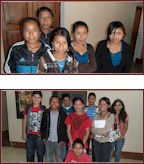
 See
the most recent
photos. See
the most recent
photos.

 
 Co-Founder,
Debora Prieto, Co-Founder,
Debora Prieto,
 teaching 3-2-1
Shadow
to teaching 3-2-1
Shadow
to
 the
Philosophy Classes. the
Philosophy Classes.

 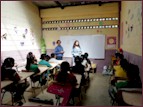

 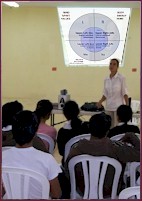

 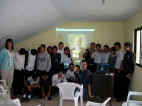
 Michael
'Mugaku' Zimmerman Michael
'Mugaku' Zimmerman
 skypes
in for a class on Zen skypes
in for a class on Zen
 with
one of our classes here with
one of our classes here
 in
Guatemala. in
Guatemala.
 Articles
on Integral
Theory: Articles
on Integral
Theory:
 (1)
(2) (1)
(2)

 Other
related articles: Other
related articles:
 Spiral
Dynamics Spiral
Dynamics
 The
Big Mind Process The
Big Mind Process
|
 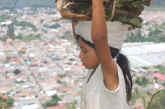
 Parents
who do not see the value Parents
who do not see the value
 of
education let their kids work... of
education let their kids work...
 An
aspect of
education here in An
aspect of
education here in
 Guatemala
is to show parents Guatemala
is to show parents
 the
value of education. the
value of education.
 When
education is valued, then When
education is valued, then
 the
girl in the photo above could the
girl in the photo above could
 go
to school instead of just go
to school instead of just
 collecting
firewood to sell. collecting
firewood to sell.


|
Critical-Thinking
Program

Since
its inception in 2012, our Critical-Thinking classes
have been attended
by over 4,000 sponsored and non-sponsored students aged
between
13 and 21 years old from impoverished towns and villages in
Guatemala.
The
Isa Fund provided us with a 3-year grant
(2014-2016) to
place six of our top students in a fulltime
Teacher-Training Program. Some of these students have been attending
our Critical-Thinking
Program since
2010.
Education
is the heart of our work. The Critical-Thinking / Advanced
Functioning
Skills
Program for
teenagers is
about changing culture
from the
inside out.
We
are
working
towards this goal,
not by teaching our students what
to think,
but
by
teaching them how to think
for themselves.
While the concept of
critical-thinking may seem simple to someone in a
developed
country, in Guatemala children are taught by
their parents that
their futures will be
a carbon copy
of all previous generations; a life of
hardship full of tough manual
labor and physical, emotional, and
psychological suffering.
IHF teaches them that
this is simply not true,
and that
they are capable of rising above this insidious cycle.
 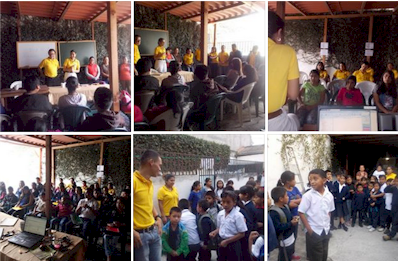
 See
the most recent
photos. See
the most recent
photos.
As part of this program, we also host guest lecturers,
in-person
and by video-Skype
to work with our classes. See photos
and video and read more;
Wisdom
Speakers

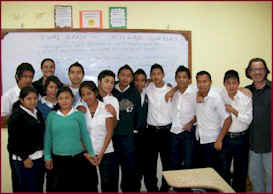  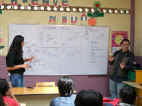  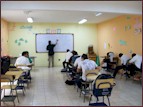
Click to see the most
recent
photos of this program.
Research
shows that children who are taught morals, ethics, and
philosophy
retain these valuable beliefs and ideas
through adulthood, leading to a life
of greater
awareness, tolerance, and overall success. In Guatemala,
most
teenagers are not given the opportunity to learn
about these mind-expanding
concepts, as the
circumstances they
were born into force them into a life
of
menial labor and extreme hardship.
The Integral
Heart Foundation offers an opportunity for children to
expand
their minds and greatly increase their
chances of
breaking free from the cycle
of poverty. The goal of
this program, which began in 2010, is to create
conscious
leaders through an advanced educational
program, which includes the
development of mind, body,
spirit, and emotions
to deliver long-term
sustainable
solutions in the resource-poor environments in which
they work.
The
Topics:
In this
program each adolescent will be introduced to the
following:
- Emotional Management / Concepts in Empathy
- Concepts of classic philosophy, such as Plato &
Descartes
- Meditation, both the posture, practice, and
application
- Awareness and appreciation of world religions
- Sexuality and appreciation of sexual preferences
- Ego and Shadow and anger management
-
Potential, self-esteem and self-love
- Cognitive Behavioral Therapy to reduce
depression
- Morals and ethics
- Human evolution and evolution of consciousness
- Existentialism, Pragmatism, and Fallibilism
- Values, value hierarchies, and decision making
- Integral Theory / AQAL and the ability to take
multiple perspectives
- The Big
Mind Process
and Zen
IHF founders, teachers, and authors Mick Quinn and
Debora Prieto teach
multiple Integral Philosophy /
Critical-Thinking classes several times per
week to boys
and girls ages 13-20, many of whom are also
sponsored
through the IHF Sponsorship Program. In addition to
these children receiving an
education
of this kind (many
for the first time in their lives), they are
simultaneously learning how to think
about the world and
their
experiences in completely new ways.
Measuring
Impact:
In order to
measure the impact of the Integral Education Program,
they collect
data at three different levels;
student,
classroom and management, all of
whom operate in a
resource-poor context. In addition to the positive
feedback
Mick and Debora receive during these classes
themselves, they have also tested
the teenagers on how
they think about the world and their place in it before
the
classes have begun,
and again once they have
completed each year of classes.
For more on how we measure results please
visit our impact page.
The
Basis:
The classes
at the Integral School Guatemala are based on the
lifework of
Ken Wilber, American author
and philosopher whose
work formulates Integral Theory. Ken Wilber
has written over 25 books
that have
been
translated into about 57 languages.
Integral Theory shows the students how to deal with
challenges in a
fresh and new way, how to be open
minded to
different cultures and
religions, and also alternative strategies to violence and
crime.
Integral
Theory begins with the current level of understanding of
the
class and then supplements current beliefs
and
understandings. It builds
upon that which already exists, without denying or
degrading any of the
systems of
thought or belief that have taken the students
to where they
are today.
Integral
Theory teaches individual competency and social skills,
and
encourages taking responsibility, not only
for the self
but also for
other people.
The goal of
the Integral Education Program is to end poverty
through
advanced education. By using Integral
Theory we are
broadening the
perspective of the individual to embrace the global
issues that are facing all of us.
Program
Objectives:
Strategic Objective 1:
Increase
and improve value, moral and ethical knowledge amongst
young people aged between 13 and 20 years living in 4 communities in the department of Sacatepéquez.
Strategic Objective 2:
Increase
and improve knowledge of holistic concepts of tolerance,
conscientiousness and compassion amongst young people
aged between 13 and 20 years living in 3 communities in
the department of Sacatepéquez.
Strategic Objective 3:
Increase
and improve the emotional control abilities amongst
young people aged between 13 and 20 years living in 4 communities in the department of
Sacatepéquez.
On-Going
Program Goals:
Development
of a curriculum suitable for the Guatemalan culture,
based on the Integral Theory developed by the American
philosopher, Ken Wilber.
Introduction and implementation of first quadrant of
curriculum (Individual Interior the ‘I’) which
covers the concepts of Big
Mind, Philosophy, Spiral Dynamics, Zen Meditation, Shadow,
Morals, Perspectives, and Values. Teaching methods is
very interactive, including dynamic exercises and group
work, with a focus on sharing experiences, ideas and
thoughts.
Review of first
quadrant of curriculum before implementation of second
quadrant of curriculum.
Introduction and implementation of second quadrant
of curriculum (Collective
Interior, the ‘We’) which covers the concepts of Ethics,
Religions, Sexual Relationships, Integral Parenting, Work
Relationships, and our Relationships with different
Species. Teaching methods is very interactive, including
dynamic exercises and group work, with a focus on
sharing experiences, ideas and thoughts.
Review of second
quadrant of curriculum before implementation of third
quadrant of curriculum.
Introduction and implementation of third quadrant of
curriculum (Individual
Exterior, the’ It’) which covers the concepts of
Martial Arts, Diet, Dreams, Sciences, Energy,
Exercise, and Behaviors. Teaching methods is very
interactive, including dynamic exercises and group work,
with a focus on sharing experiences, ideas and thoughts.
Review of third
quadrant of curriculum before implementation of fourth
quadrant of curriculum.
Introduction and implementation of fourth quadrant
of curriculum (Collective
Exterior, the ‘Its’) which covers the concepts of
Economics/Money, Law, Family, Social Structures,
Health Systems, Governments, Education, and
Anthropology. Teaching methods is very interactive,
including dynamic exercises and group work, with a focus
on sharing experiences, ideas and thoughts.
Review of all
curriculum.
Projected
Results:
Overall leads young people to learn about their self
worth and value to society, based on morals, values and
ethics and the implementation of
these in their daily lives, and through their own
actions encourage and teach others within their family,
community and society.
Short
term result: provision of the opportunity for young
people participating in the Philosophical and Critical
Thinking Program to learn about critical life changing
concepts.
Midterm result: development of young people’s abilities to
identify, assess, and control their own emotions, and
manage their responses to the shifting emotional states
of other individuals and groups.
Long term result:
implementation of the Philosophical and Critical
Thinking concepts learned as part of daily activities in
all stages of life, therefore giving others the
opportunity to develop and learn the same concepts.

More
about Integral:
You
can see
Curriculum
Maps here.

About Guatemala:
Guatemala
is a republic. It is 108,890 square kilometers (42,042 square
miles),
that is about the size of Virginia, half the size of the
UK and a little bigger than
Ireland. Guatemala is the next country
south of Mexico and with a population
of 14 million people, it is
the second most densely populated country in
Central America.

|